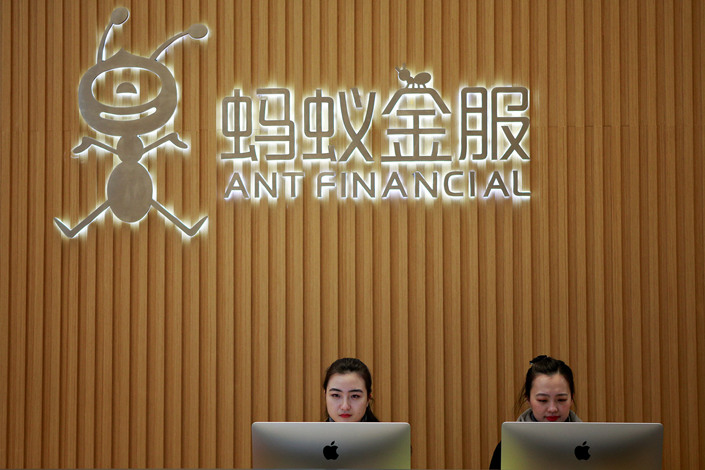Ant Financial Renames Health Insurance-Like Product After Regulator Says It’s Not Insurance

Ant Financial has taken over control of a popular health insurance-like product that it launched with a partner last month after regulators took issue with calling it “insurance,” the fintech company said.
The setback for Ant Financial marks the latest sign that Chinese regulators are stepping up scrutiny on the tech industry’s freewheeling expansion into finance.
Ant Financial Services Group, an affiliate of e-commerce giant Alibaba Group Holding Ltd., took control of a product it called “Mutual Protection Insurance,” which it launched in October with partner Trust Mutual Life Insurance Co.
The product essentially provides policyholders with protection similar to conventional health insurance.
Mutual protection gathers a group of policyholders — or “members” in their words — who can receive health care coverage for free and only need to share medical expenses when one of them falls ill. The plan can be more affordable than traditional health insurance because each member needs to pay no more than 0.1 yuan ($0.01) per case to cover another person’s health expenses, according to a note on Alipay, Ant Financial’s online payment platform, which hosts the product.
This can potentially benefit lower-income families and individuals who don’t necessarily get full medical coverage from public programs. Its members can initially enroll in the program for free. Mutual protection also guarantees that each member will have to pay out no more than 188 yuan to cover other members’ health expenses in 2019.
Under pressure from regulators, Ant Financial announced on Tuesday that it will take over the business from Trust Mutual and rename the product “Mutual Protection” because regulators said the product has violated insurance regulations.
“Mutual Protection is essentially mutual online aid, but it was operated by a licensed insurance company. Now such a rectification means that the product has returned to its original form of online mutual help,” a source in the industry told Caixin.
Regulators took action as early as 2015 to respond to new kinds of insurance products. In October 2015, insurance regulator issued a note (link in Chinese) to address the risks of online mutual aid platforms. It pointed out that such platforms are forbidden from calling themselves insurance, providing implicit guarantees, illegally raising funds to create capital pools or promoting themselves by saying that they are under the government’s supervision.
This means that there is currently no regulation in place to cover these kinds of online financial products.
Given the looser regulatory environment at the time, hundreds of such platforms appeared in 2016, said Li Haibo, founder of mutual aid platform Bihu Huzhu, in a commentary (link in Chinese) on Caixin. However, many of them operated with promotions that did not comply with regulatory guidelines, leading to another note from the regulator reiterating a clear distinction between an insurance product and an online mutual aid plan, Li said, adding that regulators have increased their scrutiny since then.
The Mutual Protection Insurance rolled out last month by Trust Mutual, a licensed mutual insurance company backed by Ant Financial, also caught the attention of the insurance regulator, Li said.
“From the regulator’s perspective, Mutual Protection Insurance was clearly not an insurance product, which in fact did not fall under the supervision of any current rule, even though it essentially operates like an insurance plan,” Li said.
The companies that run such platforms are not licensed insurance institutions, leaving mutual aid plans in a gray area.
Tencent-backed online mutual aid platform Shuidi Huzhu also said that its plan is not an insurance product, but a charitable platform for members of a community to help one another. It also pointed out that the money that members add to their accounts “are not premiums, and members should not expect to receive guaranteed claims.”
Despite the uncertainties, online mutual aid platforms have drawn in an enormous number of users. As of Thursday, just two days after Ant Financial’s announcement, its new Mutual Protection plan exceeded more than 4.8 million registered members. Tencent’s Shuidi Huzhu said that it has over 53 million members, according to its page on WeChat.
Another tech giant, JD.com Inc., also got in on the action, albeit briefly. This month, it rolled out an online mutual aid plan called JD Hubao that it had to roll back within a day.
Regulators, nonetheless, appear to have grown increasingly wary of such expansions. Private companies must have “public spirit” when they help build financial infrastructure, and their activities must be guided and overseen by the government to ensure the stability and safety of the system and protect user privacy, former central bank governor Zhou Xiaochuan said in a speech this month at the Caixin Summit.
Contact reporter Timmy Shen (hongmingshen@caixin.com)

- 1Cover Story: China Carves Out a Narrow Path for Offshore Asset Tokenization
- 2Drownings Shake Chinese Enthusiasm for Travel to Russia
- 3Over Half of China’s Provinces Cut Revenue Targets
- 4Li Ka-Shing’s Port Empire Hit by Forced Takeover Amid Panama Legal Dispute
- 5In Depth: China’s Mutual Fund Industry Faces Overhaul After a Banner 2025
- 1Power To The People: Pintec Serves A Booming Consumer Class
- 2Largest hotel group in Europe accepts UnionPay
- 3UnionPay mobile QuickPass debuts in Hong Kong
- 4UnionPay International launches premium catering privilege U Dining Collection
- 5UnionPay International’s U Plan has covered over 1600 stores overseas





